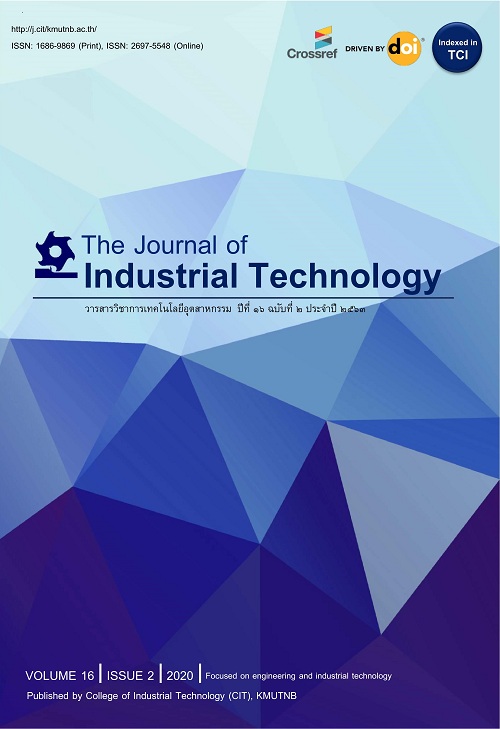การทดสอบศึกษาสมรรถนะและมลพิษของเครื่องยนต์ก๊าซธรรมชาติ ที่อัตราส่วนการอัดต่างๆ
An Empirical Study of Performance and Emission Characteristics in a Natural Gas Engine with Various Compression Ratios
Abstract
บทคัดย่อ
งานวิจัยนี้เป็นส่วนหนึ่งของการศึกษาเกี่ยวกับพลังงานทางเลือกเพื่อตอบสนองต่อวิกฤติพลังงานและสิ่งแวดล้อมในปัจจุบัน โดยเป็นงานวิจัยเชิงการทดลองที่มีเป้าหมายเพื่อเปรียบเทียบสมรรถนะระหว่างเครื่องยนต์ดีเซล Daedong 4A220 ขนาด 2,197 cc สี่สูบ สี่จังหวะที่ใช้เชื้อเพลิงดีเซลกับเครื่องยนต์เดียวกันที่ถูกดัดแปลงเพื่อใช้ก๊าซธรรมชาติระบบดูดโดยเปลี่ยนอัตราส่วนการอัดเป็น 9.0, 9.5, 10.0 และ 10.5 ต่อ 1 ผลการทดสอบพบว่าเครื่องยนต์ที่ใช้เชื้อเพลิงก๊าซธรรมชาติสามารถสร้างแรงบิดและกำลังสูงกว่าเครื่องยนต์ดีเซลในทุกช่วงความเร็วรอบและสูงที่สุดถึง 13.07% ที่ 2,600 rpm เครื่องยนต์ก๊าซธรรมชาติยังมีข้อได้เปรียบในด้านประสิทธิภาพเชิงความร้อนและอัตราความสิ้นเปลืองเชื้อเพลิงจำเพาะมากถึง 10.03% และ 36.75% ตามลำดับ และเมื่อเปรียบเทียบกันระหว่างเครื่องยนต์ก๊าซธรรมชาติที่อัตราส่วนการอัดต่างๆ กัน พบว่าปริมาณ NOx จะเพิ่มขึ้นตามอัตราส่วนการอัดที่สูงขึ้นถึง 10:1 และปริมาณ NOx จะเริ่มลดลงเมื่ออัตราส่วนการอัดเป็น 10.5:1 อัตราส่วนการอัดที่เพิ่มขึ้นมีความสัมพันธ์โดยตรงต่อปริมาณ THC แต่ไม่พบผลกระทบต่อปริมาณ CO
Abstract
This research is a part of alternative fuel studies which responses to the current energy and environment crisis. The experiment was aimed to compare the performance between an original diesel engine and a natural gas dedicated diesel engine with various compression ratios of 9.0, 9.5, 10.0 and 10.5 to 1. ADaedong 4A220 4-stroke 4-cylinder 2,197 cc was chosen as the tested engine. The results showed that the natural gas engine produced higher torque and power than that of diesel engine up to 13.07% at 2,600 rpm. Natural gas engine also showed advantages in term of thermal efficiency and specific fuel consumption which are 10.03% and 36.75% respectively. In addition, NOx emission increases as the compression ratio increases to 10.5:1. Then NOx emission begins to decrease when the compression ratio increases. The compression ratio significantly affects the hydrocarbon emission concentration while it does not show any relation with the carbon monoxide emission.
Keywords
Refbacks
- There are currently no refbacks.






